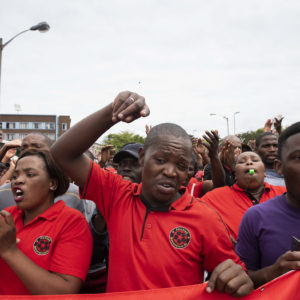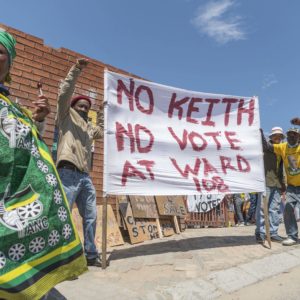July riots reports exposes SA’s failed neoliberalism
Sparked by Jacob Zuma loyalists but spurred by infighting and impoverishment, the 2021 riots show a society trapped between predator politics and state abandonment.
Author:
17 March 2022

The South African government recently released its 154-page report on the rioting that devastated parts of KwaZulu-Natal and Gauteng in July 2021. A panel of academic and security officials investigated the causes of the “unrest” and the state’s response to it. Along with hundreds of deaths – as it notes, many victims’ names are still unknown – the riots caused billions of rands worth of property damage.
Based on interviews, research and site visits, the report is a scathing depiction of how a combination of violent ANC factionalism, and police and governmental failings collided with socioeconomic desperation. This led to a week of chaos, which will continue to influence South Africa’s politics and psychology in the years to come.
While the report does include testimony from progressive and credible organisations, it ultimately reflects the conservative, top-down viewpoint of the state security apparatus. It gives ample evidence that the root cause of the July riots was the ANC’s political infighting. This inflamed the wider social disaster of the government’s commitment to austerity economics, even in the midst of the Covid-19 pandemic. But it frames these structural evils as part of a wider crisis of order in which the state is threatened by what it perceives as disenfranchised hordes, ready at a moment’s notice to smash society.
It acknowledges the reality of extreme inequality and unemployment, but reduces them to a set of “challenges” to be addressed using the tools of technocratic neoliberalism as well as more police and private security.
Related article:
The report gives damning evidence of the involvement of security officials in the riots. This includes Jacob Zuma-loyalist “masterminds” in the intelligence service and police officers participating in looting.
The South African Police Service is shown to be a dysfunctional bureaucracy that, despite many opportunities to intervene before disturbances turned into mass violence, did not provide even a bare minimum of public safety.
Despite this, the report presents the police, intelligence officials and private security companies as apolitical “good guys” who need to be allowed to do their jobs. This mirrors the state’s framing of the security apparatus. The report’s findings, however, contradict this position. It is clear that under the banner of “security”, compromised state officials and the under-regulated private security sector are involved in criminal violence in defence of patronage networks and kleptocratic power.
Hybrid conflicts
The sequence of events outlined in the report shows how Zuma supporters, with substantial resources and intelligence training, organised a destabilisation campaign in retaliation for the arrest of the former president on charges of contempt of court.
This began with attacks on trucks in Mooi River, combined with online incitement. The police were reportedly warned of the political violence in KwaZulu-Natal, but made little effort to stop the attacks, allowing a small disturbance to turn into a full-blown crisis. These attacks capitalised on endemic impoverishment, desperation and anger, turning parts of KwaZulu-Natal and Gauteng into battlefields.
The timeline also shows how these events cannot be reduced to the machinations of hidden masterminds manipulating a guileless public. Instead, it involved two linked but distinct phenomena.
While militarised Zuma supporters undertook a clear pattern of attack, the sheer scale of food rioting and general looting took on a momentum of its own. Instead of a show of support for Zuma, it revealed generalised anger and a rejection of the state and social system.
Related article:
The report makes it clear that the pandemic exacerbated hunger and instability. President Cyril Ramaphosa’s government received regular intelligence reports that 2021 could see major instability but could not provide enough social support during the worst economic downturn in South African history.
The looting of food and goods provided a cover for a pro-Zuma campaign intended to cause a governmental and economic crisis. While malls were torched, sophisticated attacks were launched on food warehouses and transport hubs, showing an advancing understanding of logistics. These small, planned attacks, in which fire protection systems were disabled, were cumulatively intended to paralyse the links between the Durban harbour and the rest of the country. The underlying strategic logic seemed to have been to cause food shortages and panic that could potentially overwhelm the state and force a regime change, to Zuma’s benefit.
Targeting civilian spaces and infrastructure is a key tenet of contemporary warfare, or “fourth generation warfare”, in which conflict has become decentralised. Instead of uniformed state opponents waging war on each other, a patchwork of security forces and private military contractors fight non-state actors, such as militias and drug syndicates. The line between civilian and combatant disintegrates. Contemporary warfare includes tactics such as spectacular violence (burning infrastructure), economic sabotage, deploying proxy forces in gangs and far-right street violence.
Endemic political violence has been allowed to run rampant in KwaZulu-Natal. This includes regular assassinations of community activists and ANC councillors, and pro-Zuma “business associations” and “veterans’ groups” being implicated in extortion and attacks on migrants. This violence presaged the July riots.
Paralysed officials
The government’s response to the riots shows contempt for accountability and any conception of a wider public good. Police minister Bheki Cele and commissioner Khehla Sitole are engaged in a personal spat that has had severe consequences for the governance of the police. It appears as though they spend more time blaming each other and avoiding communication than trying to stabilise the largest political crisis since 1994.
This extends to various Cabinet ministers. The state seemed to tolerate the violence in KwaZulu-Natal because it was seen as coming from ANC supporters. But once it was clear that there was a major social and economic crisis unfolding, arrogance, denial and ineptitude paralysed officials.
Sitole was asked to resign months ago but remains in his position. Ramaphosa came to power on a platform of government renewal, but his seeming inability to ensure even a bare minimum of conduct for officials has allowed corrosive practices and criminality to flourish.
Related article:
The report concludes that the kleptocracy of the Zuma years and the subsequent era of personal protective equipment looting has undermined respect for the state. It must be restored at all costs.
But what is omitted is the real structure of power. The government is a dysfunctional neoliberal oligarchy that continues to exploit its citizens while being incapable of offering protection or stability in return – as the July riots made clear.
The report shows that unless you are a corporation or politically connected, you are owed no accountability or safety. Yet it concludes that society needs a new respect and obedience for a state that cannot even protect its symbolic centre of power – Parliament in Cape Town – from catching fire.
Alarm bells
A realistic government would view this report as alarming. It shows how austerity and kleptocracy are creating an increasingly precarious society. But the state is far more likely to focus on the report’s conclusions about public order and securitisation.
South Africa has an intractable public order problem, which necessitates a constant police presence, the report concludes. There are supposedly not enough trained officers to meet crowd control situations. But the reason we need so many public order police officers is spelled out in the rest of the report. A broken system of failed neoliberal economics and an extractive and abusive local government create the majority of public order incidents, which are often met with extreme police violence. At the same time, the police are reluctant to intervene when ANC-aligned groups or xenophobic organisations perpetrate far more destructive public violence.
This has been reflected in the state’s response to criminal arrests and prosecutions after the riots. Instead of making cases against politically connected individuals and groups who pose a severe public safety threat, the police launched military-style raids on impoverished communities to recover small amounts of property it claimed was stolen.
It is in the government’s interest to pretend we have an unsolvable public order situation because it means expanded power and budgets for the police, prisons and the private security complex. This is the South African version of disaster capitalism, where socioeconomic turmoil and collapse are more lucrative to exploit than to solve.
Related article:
The report ends with claims that the July riots reflect a global situation in which masses of people confront an outnumbered police force. It suggests that “authorities had to undertake emergency measures to restore the rule of law” in the examples of Occupy Wall Street in 2011 and the 2019-2020 Chilean protests. This is a distorted police history. In reality, the police used provocative tactics and extreme force on demonstrators at these events.
Neither of these events were random outbreaks of popular anger. They reflected direct emancipatory goals. Despite state repression, the Chilean protest led to the election of the government of Gabriel Boric, who aims to reform and dismantle authoritarian neoliberalism. In contrast, the high-level Zuma supporters who exploited social misery to spark a conflagration are defending kleptocracy and the principle that the powerful are above the law. The fact that the government – which has shown hostility to non-violent and progressive political organising since 1994 – cannot distinguish between these shows why it is important to retain scepticism about any sweeping claims about the danger of groups of people massing.
Burning malls and ad hoc militias forming on empty highways are part of the world late capitalism has built. Instead of empowering and enriching the security state, we need more social solidarity and meaningful economic interventions.




